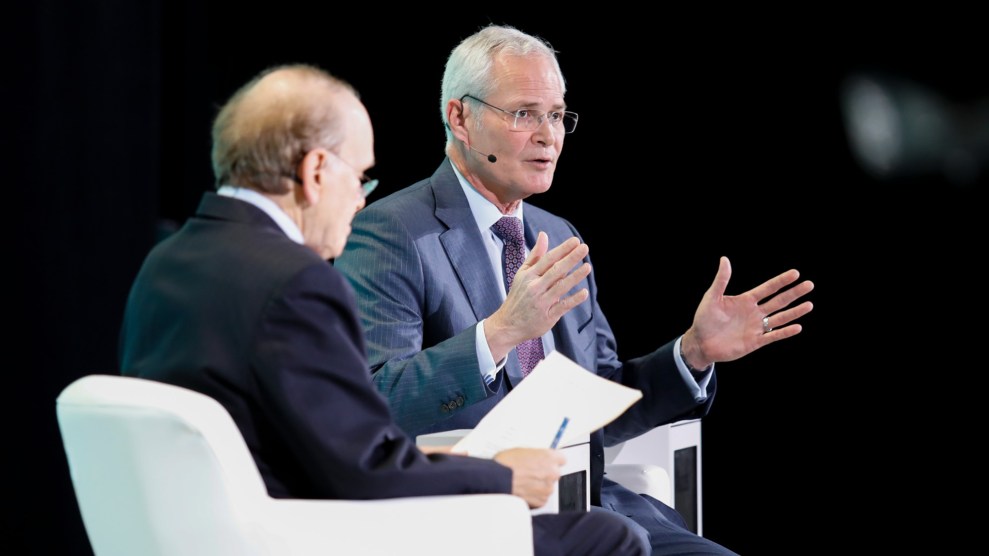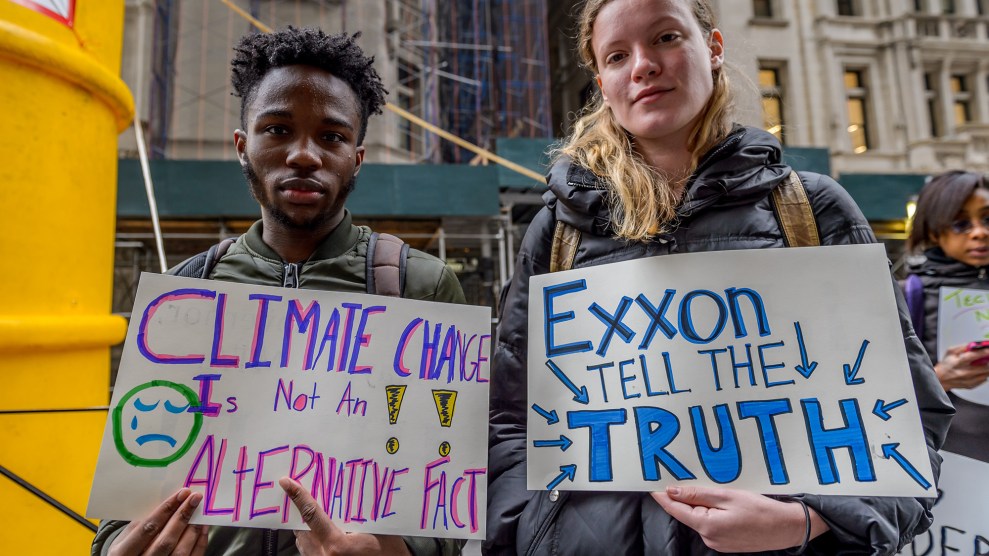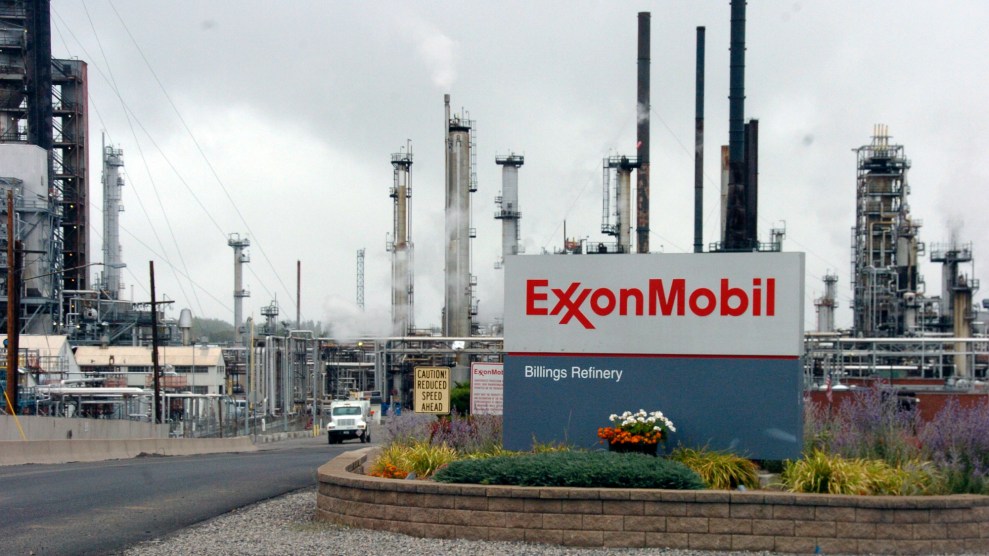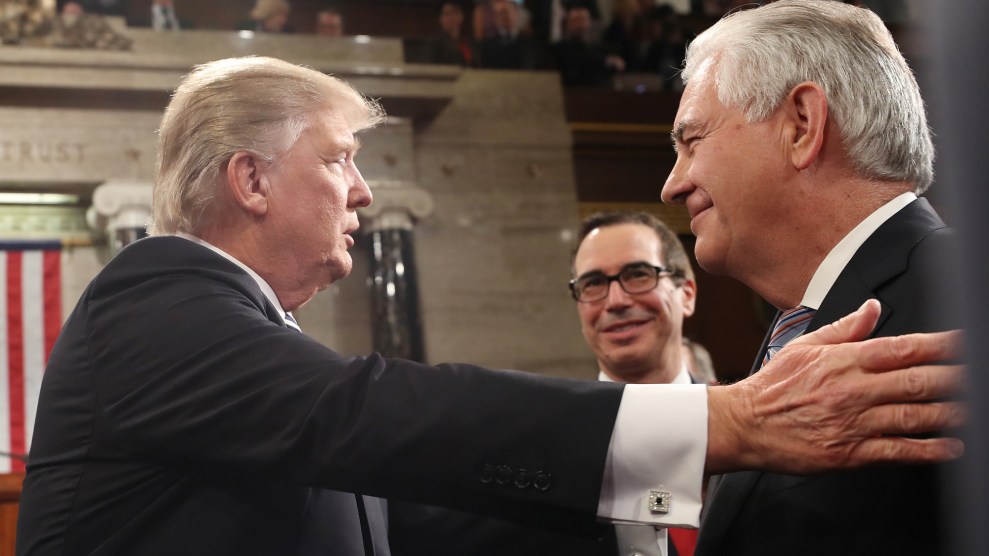
Darren Woods, Chief Executive Officer of Exxon Mobil Corporation, speaks to Daniel Yergin during a CERAWeek panel in March 2023.Reginald Mathalone / ZUMA
This story was originally published by the Guardian and is reproduced here as part of the Climate Desk collaboration.
The world is off track to meet its climate goals and the public is to blame, Darren Woods, chief executive of oil giant ExxonMobil, has claimed—prompting a backlash from climate experts.
As the world’s largest investor-owned oil company, Exxon is among the top contributors to global planet-heating greenhouse gas emissions. But in an interview, published on Tuesday, Woods argued that big oil is not primarily responsible for the climate crisis.
The real issue, Woods said, is that the clean-energy transition may prove too expensive for consumers’ liking.
“The dirty secret nobody talks about is how much all this is going to cost and who’s willing to pay for it,” he told Fortune last week. “The people who are generating those emissions need to be aware of and pay the price for generating those emissions. That is ultimately how you solve the problem.”
Woods said the world was “not on the path” to cut its planet-heating emissions to net zero by 2050, which scientists say is imperative to avoid catastrophic impacts of global heating. “When are people going to willing to pay for carbon reduction?” said Woods, who has been Exxon’s chief executive since 2017.
“We have opportunities to make fuels with lower carbon in it, but people aren’t willing to spend the money to do that.”
Experts say Woods’ rhetoric is part of a larger attempt to skirt climate accountability. No new major oil and gas infrastructure can be built if the world is to avoid breaching agreed temperature limits but Exxon, along with other major oil companies currently basking in record profits, is pushing ahead with aggressive fossil-fuel expansion plans.
“It’s like a drug lord blaming everyone but himself for drug problems,” said Gernot Wagner, a climate economist at Columbia business school. “I hate to tell you, but you’re the chief executive of the largest publicly traded oil company, you have influence, you make decisions that matter. Exxon are at the mercy of markets but they are also shaping them, they are shaping policy. So no, you can’t blame the public for the failure to fix climate change.”
Troves of internal documents and analyses have over the past decade established that Exxon knew of the dangers of global heating as far back as the 1970s, but forcefully and successfully worked to sow doubt about the climate crisis and stymie action to clamp down on fossil fuel usage. The revelations have inspired litigation against Exxon across the US.
“What they’re really trying to do is to whitewash their own history, to make it invisible,” said Robert Brulle, an environment policy expert at Brown University who has researched climate disinformation spread by the fossil-fuel industry.
A 2021 analysis also demonstrated that Exxon had downplayed its own role in the climate crisis for decades in public-facing messaging.
“The playbook is this: Sell consumers a product that you know is dangerous, while publicly denying or downplaying those dangers. Then, when the dangers are no longer deniable, deny responsibility and blame the consumer,” said Naomi Oreskes, a Harvard historian of science and co-author of the 2021 paper.
Last year, another study co-authored by Oreskes found that Exxon’s own scientists “correctly and skillfully” predicted the trajectory of global warming, then spent decades sowing doubt about climate science and policies in order to protect its business model.
In the Tuesday interview, however, Woods says the world “waited too long” to develop carbon-free technologies. He said Exxon “recognized the need to decarbonize” and that a carbon tax would help achieve this, while also defending the oil giant’s comparatively meager investment in renewable energy, pointing to focus upon more nascent technologies, such as carbon capture and hydrogen fuels.
Exxon does not “see the ability to generate above-average returns for investors” from established clean energy generation such as wind and solar, Woods said. “We recognize a need for that. We just don’t see that as an appropriate use of ExxonMobil’s capabilities,” he added.
Woods does not mention that his company lobbied to fend off provisions in an earlier version of the legislation that would have levied heavy taxes on polluting companies to pay for climate efforts, or that a top Exxon lobbyist was filmed saying that the firm’s support for a carbon tax was a public relations strategy meant to stall more serious climate policies.
“For decades, they told us that the science was too uncertain to justify action, that it was premature to act, and that we could and should wait and see how things developed,” said Oreskes. “Now the CEO says: Oh dear, we’ve waited too long. If this isn’t gaslighting, I don’t know what is.”
Wagner said that Exxon was touting its ambition to slash the emissions of its own operations while also betting that the rest of the world won’t do the same, in order to continue selling oil. “He can’t have it both ways in saying ‘we are an energy company’ but then basically ignoring the cheapest source of electricity in history as something Exxon should be investing in,” he said.
The video interview comes as Exxon is pursuing a lawsuit against activist shareholders who are aiming to push Exxon to take up stricter environmental standards. Those shareholders, Woods said, were trying to stop Exxon’s central business model of selling oil and gas, which it won’t accede to.
“We want to cater to the shareholders who are real investors, who have an interest in seeing this company succeed in generating return on their investments,” he said. “We don’t feel a responsibility to activists that hijack that process…and frankly, abuse it to advance an ideology.”
Exxon has received subsidies to build out its clean energy business from the 2022 Inflation Reduction Act, Fortune chief executive Alan Murray pointed out in the interview. But Woods argued that “building a business on government subsidy is not a long-term sustainable strategy”.
“The way that the government is incentivized and trying to catalyze investments in this space is through subsidies,” he said. “Driving significant investments at a scale that even gets close to moving the needle is going to cost a lot of money.”
But the vast majority of Exxon’s own investments are still being put toward fossil fuel expansion, said Brulle.
“This is what they do: they’re going to basically blame the victim, the American public,” he said. “They spend on fossil fuels and they spend billions trying to influence public opinion, but we’re supposed to foot the bill for the damage.”












